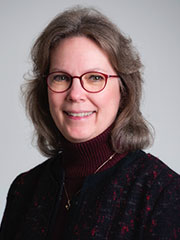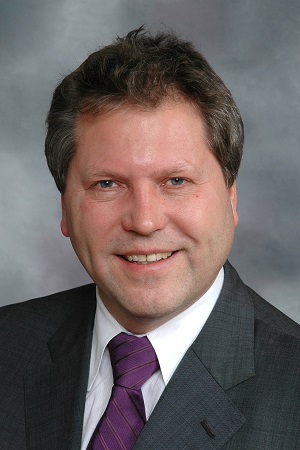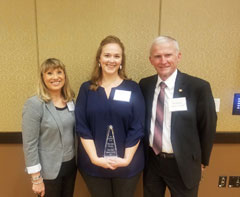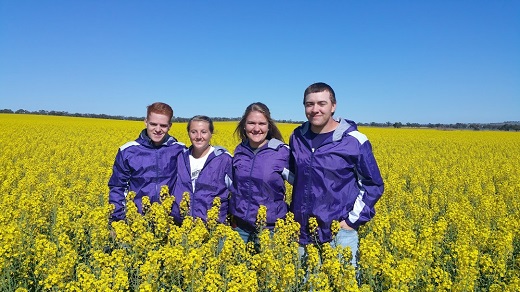11/28/18
K-State Current - November 28, 2018
K-State Current is a weekly news update for the Kansas Board of Regents to apprise the Regents on a few of the many successes and achievements made by K-State faculty, staff and students.

K-State News
Primary care for pets has a bright future at Kansas State University's College of Veterinary Medicine thanks to a record sponsorship by Hill's Pet Nutrition.
With Hill's sponsorship — the largest corporate gift in the college's history — three strategic areas in the college's Mosier Hall will be renovated to provide approximately 16,000 square feet of new space dedicated to clinical training, classroom teaching and research. The Pet Health & Nutrition Center will be named in honor of Hill's Pet Nutrition.
"This public-private partnership will enhance our educational capacity in small animal nutrition and client communication, strengthening the preparation of our graduates for success in private practice," said Bonnie Rush, interim dean of the college. "We are grateful to Hill's for its tremendous generosity and investment in our students. This integrative partnership enhances the educational experience for K-State veterinary students through shared resources and expertise. The new experiential learning environment will strengthen our training program in nutrition and primary care, and will attract student externs from colleges of veterinary medicine across North America."
"Kansas State is an important partner for Hill's Pet Nutrition as it harbors one of the most important veterinary schools in the Midwest of the U.S., said Jesper Nordengaard, vice president and general manager, Hill's US. "We are proud to support the Pet Health & Nutrition Center as we believe that it fits seamlessly in our vision to help enrich and lengthen the special relationship between people and their pets."
By renovating the space and expanding resources, students will have the opportunity to care for their clients in a private practice environment. While pet health faculty will have the capability to operate with more autonomy, specialty services remain available when clients' needs arise, Rush said.
The renovation includes the deconstruction of Frick Auditorium to create 3,400 square feet of space on the first floor of Mosier Hall for the new Hill's Pet Health & Nutrition Center. This project also will allow the addition of a 5,000-square-foot research suite on the second floor.
"We are truly excited and grateful to Hill's for partnering with us to provide this opportunity to teach primary care skills in a facility more representative of a true companion animal practice," said Susan Nelson, clinical professor in the College of Veterinary Medicine. "The new facility will allow us to be more feline friendly and enhance student training in all areas of primary care, especially in the areas of nutrition, communication, business management, diagnostics and routine surgical procedures."
"We are honored to support this great initiative, which will put K-State's College of Veterinary Medicine at the forefront of primary care and nutrition education," said Jolle Kirpensteijn, chief professional veterinary officer, Hill's US. "We look forward to a continued partnership to create a future generation of veterinarians, fully knowledgeable and confident in making nutritional recommendations, every pet, every time."
A 270-seat contemporary auditorium will be constructed in a new area of the veterinary medicine complex. Rush said additional benefits from the renovations include provision of a comprehensive educational experience in small animal nutrition and communication with pet owners; expansion of wellness training opportunities for students; additional space for routine procedures; better capabilities to serve the wellness needs of small animal clients; dedicated space for communication training and rounds; and dedicated space for nutritional displays and nutrition consultation.
Founded more than 75 years ago with an unwavering commitment to pet nutrition, Hill's mission is to help enrich and lengthen the special relationships between people and their pets. For more information about Hill's, its products and our nutritional philosophy, visit HillsPet.com or HillsVet.com, or find Hill's on Facebook using the keywords "Hill's Pet Nutrition."
Kansas State University launches Center of Excellence for Pancreatic Cancer Research
The Johnson Cancer Research Center at Kansas State University has launched a Center of Excellence for Pancreatic Cancer Research. The center has three areas of focus: cancer detection, drug discovery and studies involving in-vivo techniques and magnetic resonance imaging.
The center is led by Stefan Bossmann, professor of chemistry. The focus areas are led by, respectively, Jun Li, professor of chemistry; Duy Hua, university distinguished professor of chemistry; and Jianzhong Yu, assistant professor of anatomy and physiology.
Pancreatic cancer is the third-deadliest cancer in the U.S. Most pancreatic cancers are diagnosed late due to the absence of symptoms. Only 1 percent of people diagnosed at stage IV live another five years.
"Sadly, pancreatic cancer survival rates have remained unchanged in the past decade," Bossmann said. "New strategies for detection and treatment are urgently needed."
A major goal of the center is to make earlier detection possible by developing inexpensive liquid biopsy methods that enable frequent and routine testing for onset or recurrence of pancreatic cancer.
A second goal is to develop new drug therapies using cutting-edge chemical synthesis and characterization methods, expert nanotechnology, state-of-the-art in-vitro experimentation and ultra-high-field MRI methods.
"We are excited to fund this center of excellence that brings together outstanding K-State scientists to attack one of the world's toughest cancers as a multidisciplinary team," said S. Keith Chapes, interim director of the Johnson Cancer Research Center. "We thank our supporters for making it possible to implement this next step in our strategic plan to become a National Cancer Institute-Designated Basic Laboratory Cancer Center."
"This Center of Excellence for Pancreatic Cancer Research is an exciting step forward in K-State's fight against cancer," said Richard Myers, Kansas State University president. "Moreover, it supports our 2025 vision to be recognized as a Top 50 public research university and our goal, as a land-grant university, to improve the quality of life for all through research."
Other scientists involved in the center of excellence are Thomas Mueller, research assistant professor of biology; Om Prakash, professor of biochemistry and molecular biophysics; Punit Prakash, associate professor of electrical and computer engineering; Chris Culbertson, professor of chemistry; Tej Shrestha, laboratory coordinator in anatomy and physiology; and Matthew Basel, clinical assistant professor in anatomy and physiology. Supporting their work with pancreatic cancer biospecimens will be Anup Kasi, associate professor at the University of Kansas Medical Center.
The Johnson Cancer Research Center, in the College of Arts and Sciences, supports and advances cancer research and education at Kansas State University. All of its programs are made possible by private funding. Information about the center is at cancer.k-state.edu.
K-State Faculty Highlight
Maureen Olewnik elected president of global cereal grain science association
Maureen Olewnik, Global Food Systems Initiative coordinator, was elected president of AACC International, formerly American Association of Cereal Chemists. 
AACC International is a global nonprofit association of scientists and food industry professionals working to advance the understanding and knowledge of cereal grain science and its product development applications through research, leadership, education, superior technical service and advocacy. Olewnik assumed the role at the association's 2018 meeting in London.
Olewnik also received the association's William F. Geddes Memorial Award in 2012.
World's largest scientific society names two Kansas State University researchers as 2018 fellows
A Kansas State University infectious disease researcher and a late biology professor have been named 2018 fellows of the American Association for the Advancement of Science, or AAAS.
The two Kansas State University fellows:
- Jürgen Richt, Regents distinguished professor and director of the university's Center of Excellence for Emerging and Zoonotic Animal Diseases, or CEEZAD, for distinguished research and advisory contributions to the field of zoonotic diseases, particularly for his pioneering role in the development of the One Health paradigm.
- James Guikema, late professor of biology and university administrator, for distinguished contributions to the fields of photosynthesis and gravitational biology, and in research administration at Kansas State University and the NASA Specialized Center of Research and Training, or NSCORT.
Richt and Guikema are among 416 fellows chosen this year by the American Association for the Advancement of Science, which is the world's largest scientific society. Election as a fellow is an honor bestowed upon association members by their peers. The association's fellowship program recognizes individuals whose efforts toward advancing science applications are deemed scientifically or socially distinguished.
This year's fellows will be formally announced in the AAAS News and Notes section of the journal Science on Nov. 29. Richt and Guikema will be recognized at a certificate and pinning ceremony on Feb. 16, 2019, during the association's annual meeting in Washington, D.C.
Richt and Guikema join 21 current and emeritus Kansas State University faculty members who are fellows of the association.
"Our 2018 fellows are truly deserving of this recognition for their career accomplishments," said Peter Dorhout, the university's vice president for research. "Dr. Richt is a distinguished leader in zoonotic diseases whose work has improved animal and human health throughout the world. In a special way, this distinction by AAAS helps us remember and honor Dr. Guikema and his countless contributions to the field of biology during his service to Kansas State University."
Richt is a veterinary microbiologist who has worked with multiple agents of zoonotic potential, including bovine spongiform encephalopathy or mad cow disease, chronic wasting disease, animal influenza viruses, Rift Valley Fever virus, Borna virus and other emerging pathogens. Richt's career, which includes a seven-year assignment as lead scientist at the U.S. Department of Agriculture's National Animal Disease Center, has been spent developing novel vaccines and testing methods and remedies for a number of animal and zoonotic diseases.
Richt joined Kansas State University in 2008 as Regents distinguished professor and Kansas Bioscience eminent scholar in the College of Veterinary Medicine's department of diagnostic medicine and pathobiology. Richt became the director of the Department of Homeland Security's Center of Excellence for Emerging and Zoonotic Animal Diseases at Kansas State University in 2010. As director, he leads an international network for scientific research involving multiple U.S. universities, foreign universities, and various industry and foreign partners.
Richt has authored or co-authored more than 200 peer-reviewed articles. His work has been published extensively, including in such prestigious journals as Nature Biotechnology, Science, Journal of Experimental Medicine, PNAS, Cell Host Microbe and Journal of Virology. In 2011, Richt received the Pfizer Animal Health Award for Research Excellence and in 2014 the Kansas State University Iman Outstanding Faculty Award for Research.
Guikema devoted decades to Kansas State University as an administrator and professor of biology. He died in April 2018.
Guikema joined the Division of Biology in 1981 and spent 37 years of teaching, research, service and administration at the university. He rose through the ranks to be named associate director of the Division of Biology. His research program in plant sciences transitioned into gravitational and space biology, with multiple experiments on the space shuttle.
In 1998, Guikema became the university's associate dean of the graduate school and associate vice president for research. After 17 years, he returned to the Division of Biology to serve again as associate director. During his dedicated service in the university's central administration, he mentored students and young faculty and supported novel research and scholarly pursuits.
Guikema received a bachelor's degree from Calvin College in Michigan and a doctorate in photosynthesis from the University of Michigan. He served a two-year postdoctoral position at the University of Missouri, where he met his wife of 31 years, Sue Brown, a Kansas State University distinguished professor of biology.
K-State Student News
Jackson named Kansas School Counselor of the Year
Alicia Jackson, K-State College of Education doctoral student in counselor education and supervision, was named the Kansas School Counselor Association's 2018 School Counselor of the Year.  Jackson earned her master's degree at K-State and currently serves as the school counselor at Olathe West High School.
Jackson earned her master's degree at K-State and currently serves as the school counselor at Olathe West High School.
The Kansas School Counselor Association award recipients were announced at the association's recent fall counseling conference. Jackson will represent Kansas in the selection process for the 2019 American School Counselor Association School Counselor of the Year in Washington, D.C. Jackson will travel to Washington, D.C., and be considered along with other state representatives for the National School Counselor of the Year Award.
Nominations for the school counselor awards program are submitted to the association and an awards committee consisting of school counselors, school counselor educators and school administrators review the applications to make the selection for the awards. The Kansas School Counselor Association School Counselor of the Year is selected on the criteria of school counseling innovations, effective school counseling programs, leadership and advocacy skills, and contributions to student achievement.
K-State Crops Team places third in Australian universities crops competition

Four members of the Kansas State University Crops Team recently returned from a study trip to Australia where they competed in the Australian Universities Crops Competition. The event was hosted by the Australian Grain Growers organization and was held in Temora, New South Wales. The K-State team traveled with seven students from Iowa State University and two students from the University of Minnesota-Crookston who also participated in the competition. A team from Virginia Tech University also competed, along with other agricultural universities across southern and western Australia.
K-State Crops Team members making the trip and their hometowns included Keren Duerksen, Newton; Kaylin Fink, Chapman; and Trent Frye, Belleville, all seniors in agronomy, and Nathan Ryan, Louisburg, Missouri, junior in agronomy. The team was accompanied by coach Kevin Donnelly, professor of agronomy. This was the fourth trip for the K-State team since 2012 to participate in the Australian competition.
The K-State team took third place in the contest, led by Trent Frye who was the eighth place overall individual. The University of Sydney placed first, followed by Charles Sturt University from Wagga Wagga, Australia.
Team members Duerksen, Fink, and Ryan were awarded a stipend from the American Society of Agronomy to cover part of their travel expenses as a result of previously placing in the top five in the U.S. Collegiate Crops Contests in Kansas City and Chicago in November, 2017. Additional sponsors of the K-State team were the Kansas Corn Growers Association, Kansas Grain Sorghum Commission, Syngenta, Landmark Implement, Polansky Seed, Norder Supply, and the K-State Department of Agronomy. The university’s College of Agriculture also provided international travel scholarships to the K-State students.
The competition was held over two days at the Temora Agricultural Innovation Centre, managed by FarmLink. The contest included a seed identification section, three exams over production of selected Australian crops, commercial grading of wheat samples, a business management problem, field yield estimates, management recommendations, and a live crop, weed, and disease evaluation component.
Before and after the competition, the group toured a large irrigated farm, two grain farms featuring mixed cropping systems, a sheep farm, a cherry orchard and processing facility, and a vineyard and winery. They also toured the Rhizolysimeter Center at Charles Sturt University and a field station operated by AGT, the largest wheat breeding company in Australia. Learning about canola and Australian white wheat production, ryegrass herbicide resistance problems, and the use of pulse crops such as lupins and fava beans in crop rotations were highlights for the U.S. teams.
The students also took the opportunity to learn more about Australia. The trip began with visits to popular sites in Sydney, followed by a trip to the Great Barrier Reef at Cairns. On the trip to Temora, the group visited the Blue Mountains west of Sydney. After the contest, they travelled to Melbourne and viewed the Twelve Apostles and other majestic rock formations along the southern coastline on the Great Ocean Road. Seeing koala bears in the wild at a park along the way was a highlight of the trip.
